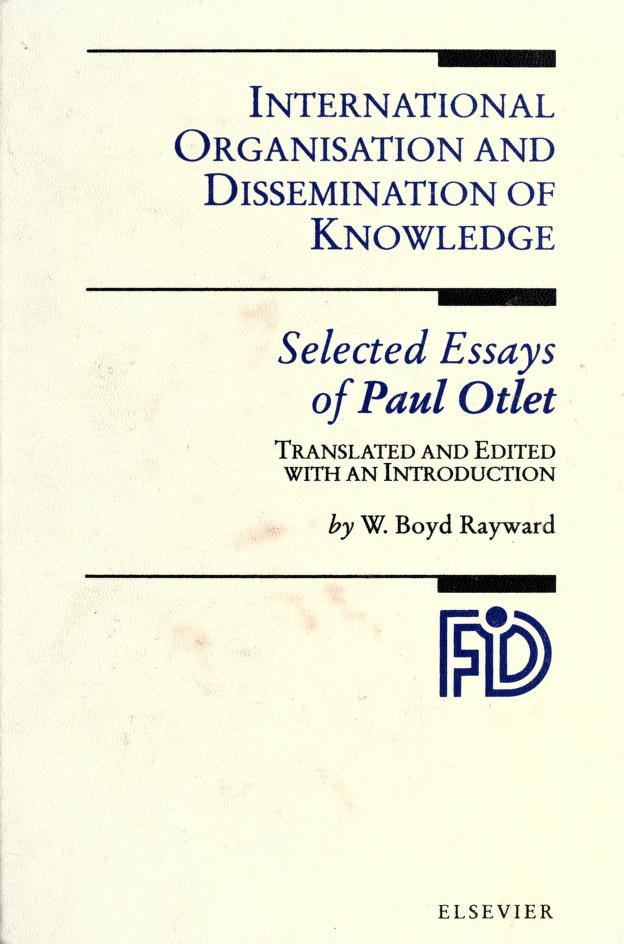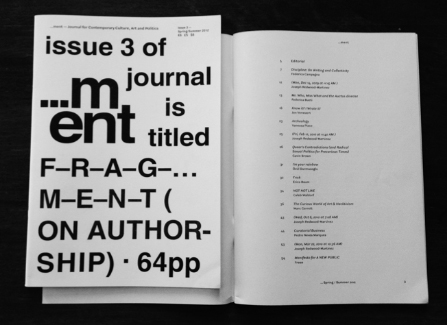Paul Otlet: International Organisation and Dissemination of Knowledge: Selected Essays (1990)
Filed under book | Tags: · bibliography, book, knowledge, knowledge production, library

“These translations of a selection of Paul Otlet’s writings have been a long time in preparation. Now put down, now taken up again over a period of ten years or so in Chicago, London and Sydney, they are dispatched at last to Amsterdam with relief. They follow an earlier biographical and institutional study of Otlet and the International Institute of Bibliography (now FID, the International Federation for Information and Documentation). The publication of that work left me with a troubled sense of more that needed to be done, of an obligation incurred but not yet discharged. It has always seemed to me that, though not entirely neglected, Otlet’s contributions to our understanding of bibliography, documentation and what is now called information storage and retrieval, sometimes information science, and the technical and institutional arrangements needed to maximise their social utility, have not had the attention in the English-speaking world that is their due. It is my hope that the availability of this selection of papers in English, both in themselves and because of the attention that the act of publication can engender, will encourage a renewal of interest in Otlet’s thinking about and work for the international organisation and dissemination of knowledge.”
Translated and edited, With an introduction by W. Boyd Rayward
Publisher Elsevier, 1990
FID Publication series, 684
ISBN 0444886788, 9780444886781
256 pages
PDF, PDF (updated on 2019-6-6)
multiple formats (Internet Archive)
Charles Bazerman: Shaping Written Knowledge: The Genre and Activity of the Experimental Article in Science (1988)
Filed under book | Tags: · epistemology, history of science, knowledge production, linguistics, literature, physics, rhetorics, science, semiotics, social science, spectroscopy, theory, writing

The immense force of scientific knowledge in our world has in recent years commanded the attention of a number of scholarly disciplines, ranging from the history of science to literary theory, from philosophy to the teaching of writing. Each foray into the language of science, however, has been motivated by the discipline and school of the researcher. Shaping Written Knowledge confronts scientific language more directly, by making its special character the real center of the inquiry. Original and extensive, this work will be of great interest to scholars concerned with the sociology and history of science, language theory, the history of literacy, the rhetoric of knowledge, technical writing, and the teaching of composition.
The emergence of the experimental article in science, Bazerman shows, is a response to the social and rhetorical situation of seventeenth- and eighteenth-century natural philosophy activated by the need to communicate findings and the exigencies of conflict that arise from communication. The appearance of the argumentative forms of scientific writing are coincident with the rise of the scientific community and the development of experimental procedures. All three interactively structure each other. Bazerman shows that later developments of the experimental article, in both the physical and social sciences of the twentieth century, have been made within the contexts of various disciplines. An understanding of what forces have shaped the experimental report, what functions the features were designed to serve, and the impact of rhetoric on the rest of scientific activity help to evaluate all statements of knowledge and increase our ability to make intelligent writing choices.
Edited for digital presentation by Patricia Klei
Publisher University of Wisconsin Press, Madison, Wisconsin, 1988
ISBN 0299116905, 9780299116903
356 pages
publisher
ebook publisher
google books
PDF (updated on 2012-6-13)
PDF (alt)
…ment Journal, 3: Frag…ment (On Authorship) (2012)
Filed under magazine | Tags: · authorship, collective art, intellectual property, knowledge production, technology

“Issue 3 of …ment investigates the current debates and practices surrounding the concept of authorship and the possible modes of resistance attached to it. Looking at broad topics such as intellectual property, collectivity, knowledge production and technology, this issue is concerned with the re-articulation of such themes in a transforming political landscape. What is an author and how do we understand authorship and its politics?”
Contributors: Erica Baum, Gavin Brown, Federica Bueti, Federico Campagna, Övül Dormusoglu, Freee, Marc Garrett,Pedro Neves-Marques, Joseph Redwood-Martinez, Vanessa Place, Jan Verwoert, Caleb Waldorf.
…ment: Journal for Contemporary Culture, Art and Politics, Issue 3 – Spring/Summer 2012
Editor-in-chief: Federica Bueti
Editors: Benoit Loiseau, Clara Meister
64 pages
launch of the issue (3 May 2012, London)
HTML (updated on 2020-10-19)
PDF (added on 2020-10-19)

